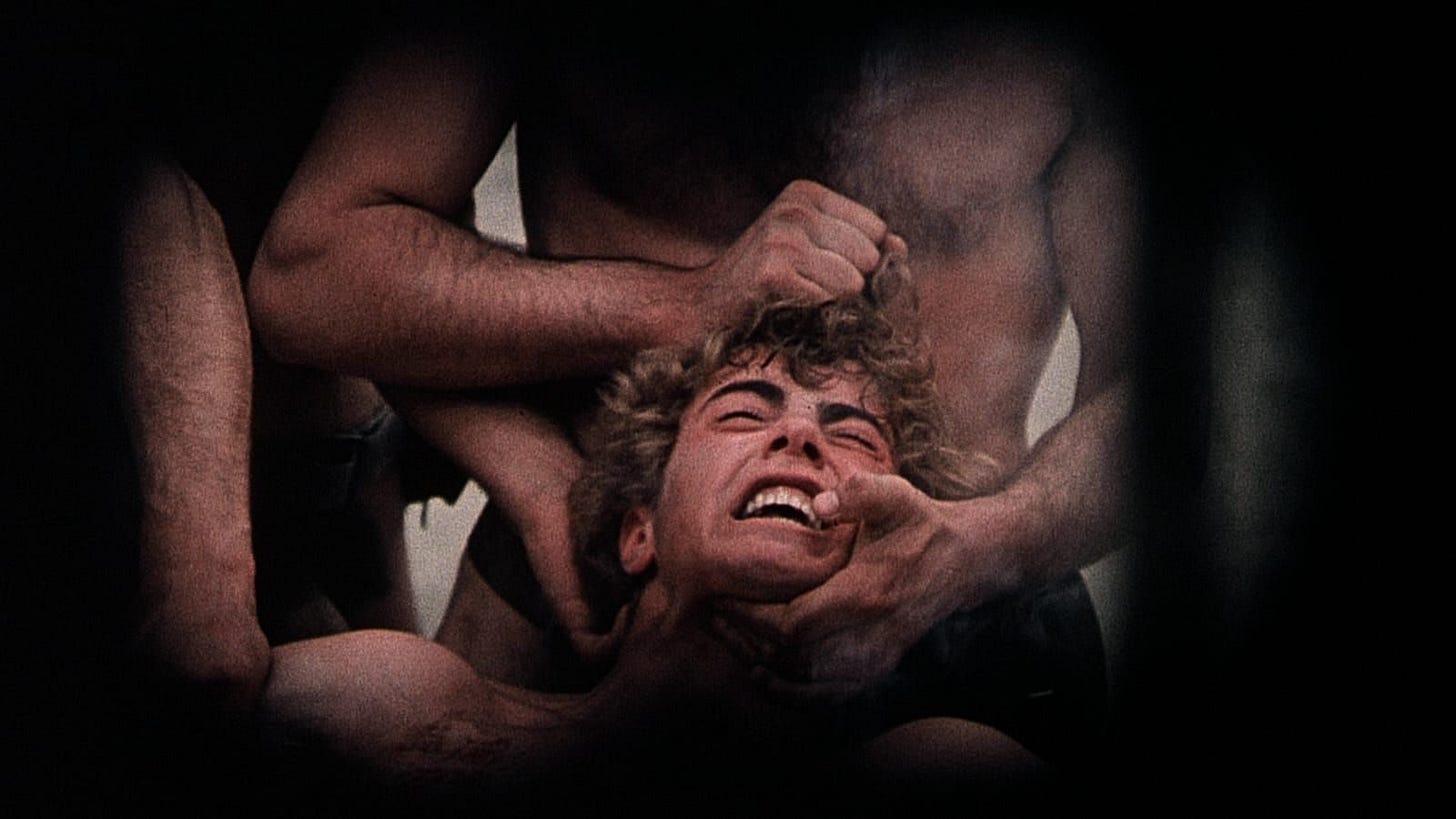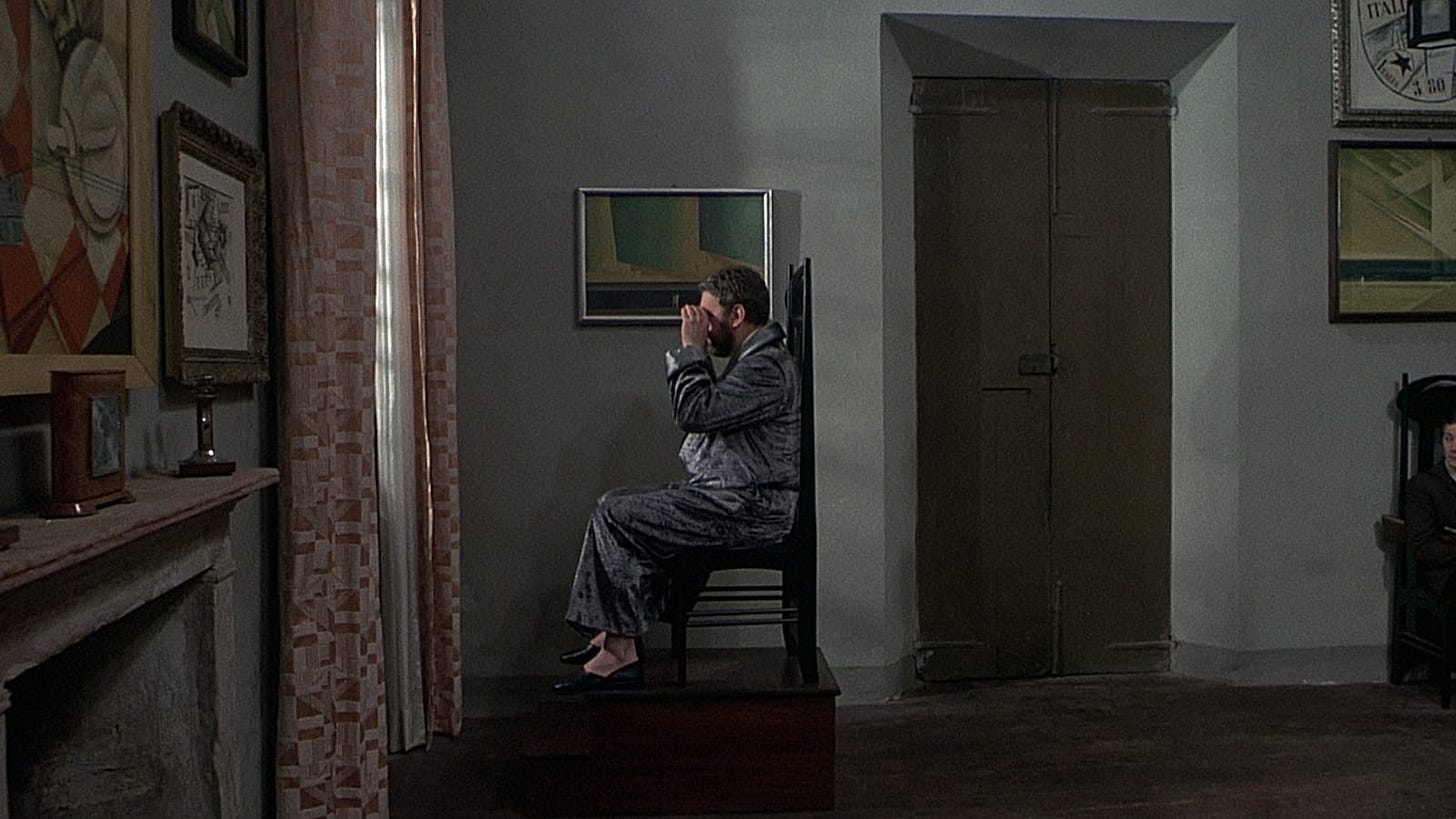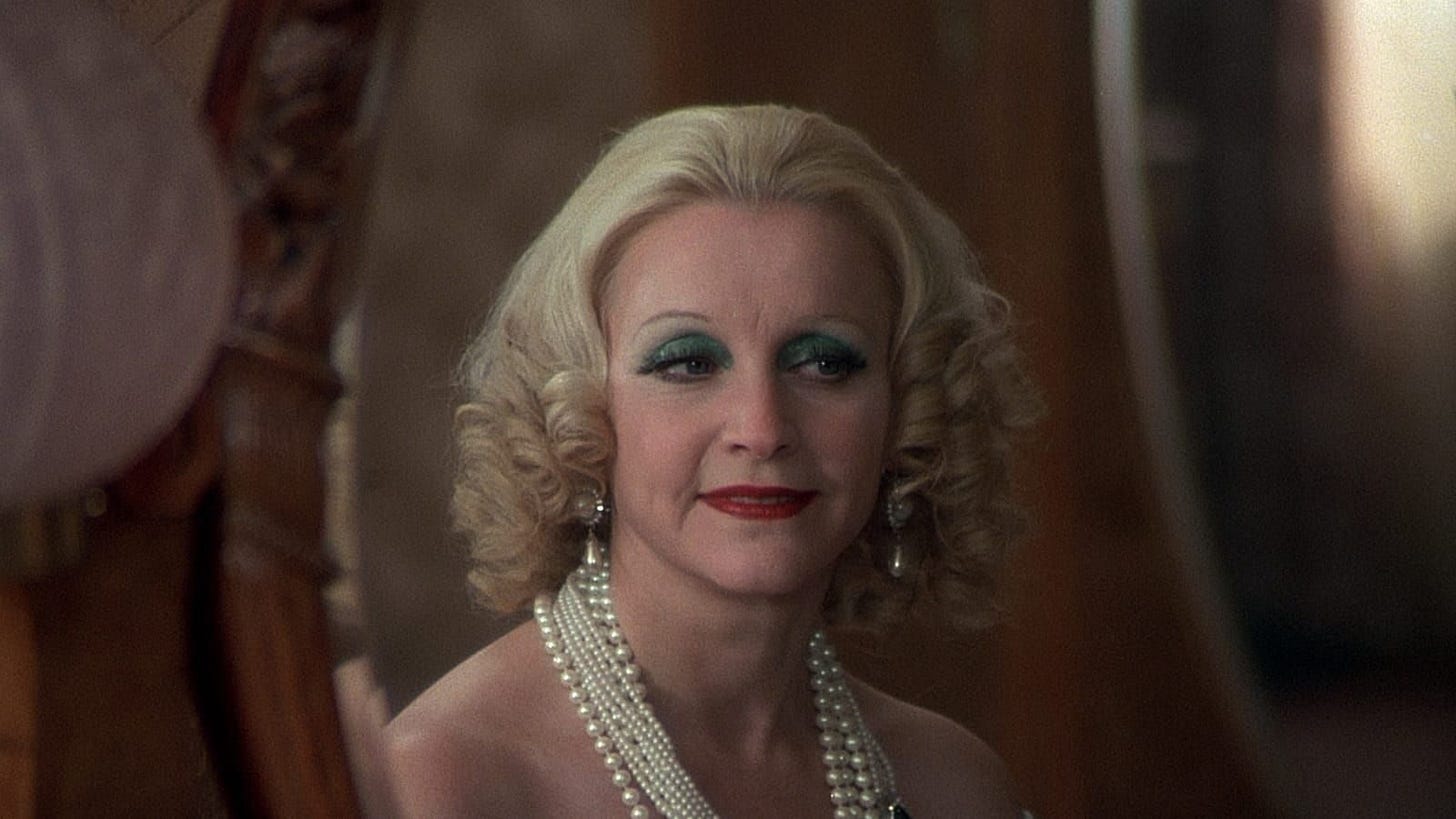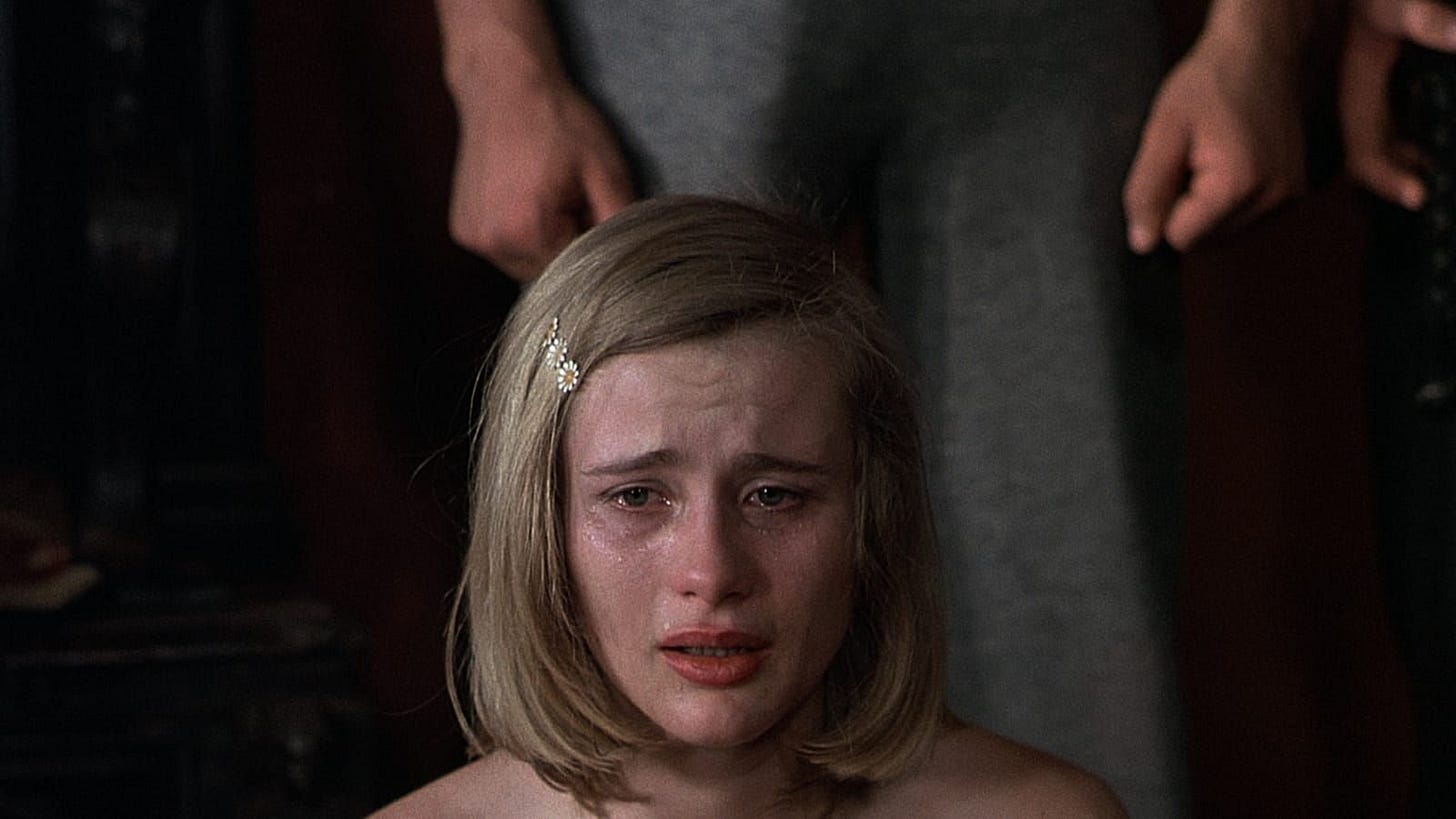Fascism's logical endpoint
On Pier Paolo Pasolini's 'Salò, or the 120 Days of Sodom'
Here is a movie with an unnerving reputation.
When people talk about Pier Paolo Pasolini’s infamous final film, Salò, or the 120 Days of Sodom, there are always a few words that pop up: Shocking, disgusting, cruel, profane… just to name a few.
Salò is designed at every turn to both provoke and unsettle, to unceremoniously embed you in a world of mental, physical, and sexual torture and stay there for all but a few minutes of its entire 2-hour runtime. It’s part of a hallowed collection of “Masterpieces you shouldn’t watch unless you know what you’re getting into.”1
Pasolini transposes the Marquis de Sade’s 18th-century novel to Mussolini’s Italy in the waning days of World War II, following a group of government bureaucrats, their ladies-in-waiting, and their personal regiment of troops as they abduct and terrorize a group of young men and women in a lavish estate. Before the war ends, these fascists will take their absolute dominion over their subjects to its logical conclusion: total debasement and unrelenting abuse.
The film teaches us that hearing about the unspeakable, seeing it, and experiencing it are less different modes of torment than they are individual components of a grand design. And everything about Salò is meticulously designed: The estate’s vast parlors and lavish dining halls; clothing (or lack thereof) that signifies various people’s standing within the film’s fascistic microcosm; a massive platter of shit that’s served for dinner.
What makes this more startling than almost any horror film I can think of is its victims’ sense of resignation. Many of them often act subdued and resigned, because they know this is part of life in a totalitarian regime. They are at the whims of men whose minds are so warped by power, who have been given free rein to unleash their basest, cruelest proclivities, and there’s nothing more to be done. The film’s horrors arise as if they were the most natural things in the world.
Pasolini’s camera, detached yet engaged, creates a remove that adds to this feeling of hopelessness. Once the subjects are rounded up and informed of their situation, the outside world all but disappears. Occasionally, one of them will cry for help or try to escape, but it’s futile; they know it, and they know that it’s too late to fight back.
Now let’s talk about the fascists!
Salò opens with four men, government higher-ups, facilitating this debauched spectacle. “All’s good if it’s excessive,” one of them tells the others. These officials are only identified by their professional titles: Duke (Paolo Bonacelli), Magistrate (Umberto P. Quintavalle), Bishop (Giorgio Cataldi), and President (Aldo Valletti).
President of what? Magistrate of what? It doesn’t matter! They have the title and their underlings listen to them; their authority and decision-making is only ever questioned from within. And when it is questioned, it is usually a point of contention over which of them gets to commit some atrocity next.
I’m not going to claim that “Salò is a comedy, actually,” but Pasolini’s sense of the absurd is key to deepening the film’s sense of terrifying hopelessness. These men appear non-descript at first, but the closer the camera looks at them, the grosser and more deformed they appear. Beneath the suits, they’re all rotten teeth, pale skin, and dead eyes.
Accompanying them are four equally garrish-yet-elegant women, the Signoras: Castelli (Caterina Boratto), Maggi (Elsa De Giorgi), Vaccari (Hélène Surgère), and an unnamed pianist (Sonia Saviange)2. While occasionally involved in the physical torment of the victims, their role is more psychological. Long stretches of the film take place in a wide-open ballroom where the ladies take turns reciting excruciatingly detailed stories of sexual perversion and abuse. Listening to them, you get the sense that they’ve experienced what is being inflicted on this crop of victims.
This, too, is crucial to the film’s design. Salò never gives its victims (or its audience) a reprieve; when the young men and women aren’t experiencing increasingly horrendous acts, they’re listening to stories about them. Their subjugation is absolute.
While Salò begins with abductions, it is not the rounding up of these victims. We watch the forced recruitment of new soldiers: young men who are similar in age to the ones they’ll be overseeing. There’s no reason given why these particular men were picked for this job. They try to flee at first, but then they accept their position. Could be worse!
This group of officials and soldiers operates without the usual justifications of totalitarian oppression; the time for that has long since passed. Instead, we are left with the warped endgame: sadistic pleasure-seeking for its own sake. Crying, begging, and screaming are flagrant turn-ons; cozying up to a tormentor or ratting out their friends may help these captives slightly, but there is ultimately no escape.
The Bishop tells one hapless young man, who believes he is about to be shot, of the futility of this wish: “Did you really think we would kill you? Don’t you see we want to kill you a thousand times, to the limits of eternity, if eternity could have limits?”
I’ve deliberately shied away from describing most things that happen in this movie in detail, both because I love and cherish my readers and because the minutia of these horrors is key to the experience of the film, if you decide you want to experience it. On the surface, the carnage it depicts may not feel as shocking as it was when it was originally released in 1975. What I find truly disturbing is the specificity of it: how each act feels like the manifestation of fascist id.
Salò is structured like Dante’s Divine Comedy, in several acts that become progressively more severe as the movie wears on. But there is no on-camera tourist or guide through the movie’s circles of mania, shit, and blood; instead, we are being shown the way by Pasolini, complicit voyeurs of the unimaginable.
Salò, or the 120 Days of Sodom is available on DVD and Blu-ray. As a therapist tells Carmela in season 3 of The Sopranos: “One thing you can never say is that you haven’t been told.”
Some others in my personal canon: In the Realm of the Senses, Crash (1996), Inland Empire, Trouble Every Day, Possession, and several Lars von Trier films.
On this viewing, I was haunted by the pianist’s arc in the film. While playing, she has her back turned to what’s happening, and she really only interacts with the victims in a bizarre ritual where she and another woman try to cheer them up. And she’s one of the only fascists to have the decency to off herself when she sees what’s happening to everyone at the end. While no one is given a backstory, hers seems clear: A position of convenience, her musical skills used as the soundtrack to depraved spectacle.





